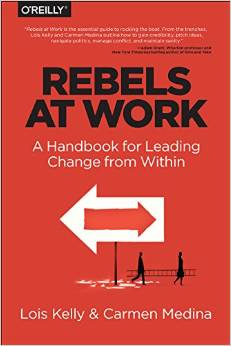Rebels at Work can obsess about winning the war of ideas in their organization. The company is headed in the wrong direction and new ideas need to be introduced; the rebel at work not only seeks to persuade; she needs to win. But what if playing to win is not the right objective for rebels at work? In fact, isn’t the whole winning and losing framework just buying into the way traditional organizations think about making decisions? Once the leaders make their strategic choices, all other options fade to black.
Let’s think of another way. Instead of seeking victory, how can the rebel make his ideas more meaningful for his group and organization? Isn’t this a much better question, one that creates more space for others to contribute and that is more respectful of what is already positive about the organization? As Radmilla Prislin, Cory Davenport, and John Michalak note in their essay, Groups in Transition: Differences in the Context of Social Change:
Social change occurs when a group changes its position on what is normative.
Those were the ideas that ran through my mind this summer as I read the book Rebels in Groups, edited by Jolanda Jettsen and Matthew J. Hornsey. In an earlier blog post this month, I wrote about what this excellent book has to say  about the contributions that dissent and rebels make to organizational health, including the awesome finding that rebels at work improve the decisions of their organizations even if their ideas don’t carry the day. See, it really isn’t about winning. It’s about making things better.
about the contributions that dissent and rebels make to organizational health, including the awesome finding that rebels at work improve the decisions of their organizations even if their ideas don’t carry the day. See, it really isn’t about winning. It’s about making things better.
Rebels in Groups digests much of the recent academic research on how groups react to dissent and rebels in their midst. It’s consistent with the advice we provide in our book Rebels at Work—if you’re trying to affect change, you need allies, strategy, and a high degree of emotional and social intelligence. But the academic research contains some additional insights that can help rebels and dissidents be more effective.
Rebels need to understand the core norms of their group. The research clearly shows that it’s much harder for new ideas to gain support if they violate essential beliefs of the group. In our book we suggest that rebels at work frame their ideas within the context of what the organization already values. The psychology of the group also matters. Groups that are more cohesive handle dissent better. Groups that have a history of incorporating new members will be more open to new ideas
When presenting new ideas, rebels at work need to do so first within their group. Teams don’t take too kindly to being criticized in front of outsiders. This goes without saying, but it’s useful to know that the research supports good manners.
Instead of criticizing the views of others, rebels should frame conversations around the availability of information. What information shapes the rebels’ views; what information is viewed as important by others? Research shows that access to different information can account for variance in views; level-setting around what is known versus what is opinion can make conversations more constructive.
Rebels can overcome a group’s natural tendency to favor continuity by pointing to the external factors that support the need for change. This is a well-understood tactic in organizational change literature, but it’s nevertheless striking how groups make different decisions when forced to consider outside perspectives.
Rebels are received better by organizations when they behave consistently. We’ve all known individuals who every month have a different new idea for what the organization could do better. You’re better off as a rebel if you identify the one or two changes that would make the most impact and then work doggedly to advance them.
There’s much more to share from Rebels in Groups. The next post will distill the lessons it offers for managers of organizations who want to encourage constructive dissent and create a healthy space for alternative views.
